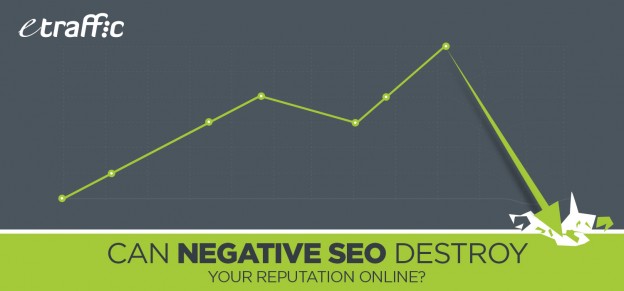![]() Posted by Cameron Francis
on
02 Jul , 2015
in
News Uncategorized
Posted by Cameron Francis
on
02 Jul , 2015
in
News Uncategorized

Did you know that your competition can hurt your business by tainting your website? Such an action can have negative repercussions on your online presence and search engine rankings. Most small business owners are unaware, but negative SEO is real. It can do significant damage to your business and reputation, driving your customers away.
This is even more important nowadays considering many people Google companies first before doing business with them. Now more than ever, your online presence is vulnerable, courtesy of negative SEO.
For those who didn’t know what negative SEO is, this is simply the reverse of legitimate SEO. Think of it as the evil twin. Instead of increasing your search engine visibility and driving more business to your website, it works by pulling down your ranking or implicating you with sketchy elements that could get your website penalised.
How is Negative SEO Carried Out?
It is important that you know how this is done so that you can protect your business and website. Having this knowledge helps you identify the possible causes.
This way, when hiring a reputable web marketing firm to fix the problem, you will know exactly what to tell them or at least understand the process needed to get your website back on track again. Please note that sometimes, you may have to completely give up the website and start all over again. Hopefully, that will not be the case with you.
Negative SEO is carried out in three major ways:
1. Bad Link Neighbourhood
Google and other search engines typically frown upon poor SEO practices such as link spamming, bad link neighbourhoods and over optimisation. Google sees each of these as bad SEO practices aimed at gaming the system.
Websites that are caught doing any of these will be penalised or even deindexed (blacklisted) from the search engines completely. So, what bad competitors often do is start building tons of backlinks within a short span of time from questionable or shady sites.
The most popular sites used for negative backlinking are adult sites. Now, with the combination of a sudden spike in link volume and repetitive anchor texts form questionable sites, this is bound to trigger Google’s and other search engines’ spam filters, thus forcing the website to undergo a manual review. And when this happens, you can be sure that the search engines won’t be merciful.
2. Malicious Actions on Your Website
Hackers are always on the lookout for vulnerable websites, so they can
- Inject malicious codes into the website
- Execute a DDoS attack
- Block your robot.txt file
- Manipulate vulnerable plugins to their advantage
Carry out these malicious attacks for so long and the search engines will bring down the hammer on your website. Besides, all of these activities are pretty sure to send the website down the ranks and into oblivion so that the hacker can take their position on the search engines.
3. False or Negative Rumours About Your Business
The absolute worst thing that can happen to your online reputation is when competitors spread negative rumours about your business. Usually this involves one or more people posting negative reviews about your website and business on popular review websites like Yelp and Brightlocal among others. The idea is for potential customers to Google and find these negative posts so that they’ll take their business elsewhere.
What You Can Do to Prevent Negative SEO
To be honest, preventing negative SEO requires some degree of experience and expertise. What you can do however is be more security conscious. Don’t leave outdated plugins or themes on your website. These are usually vulnerable and may not have the updated security fixes. You may also want to make your inner pages or website database completely inaccessible to hackers looking for some mischief.
If you use content management systems like WordPress, you’ll need to stop using easy to guess usernames and passwords and install security plugins like Wordfence, Bulletproof Security, and BruteProtect to mention a few. All of these plugins are effective in preventing any hijacking.
How to Fix Negative SEO
First, you’ll need to locate the problem. Is it in the database, embedded in html or CSS or somewhere else? How have they been gaining access to your site? Are your passwords and usernames weak?
Do you have outdated plugins and themes with possible security issues? These are just some of the things that you might need to check first.
If it’s from bad link neighbourhood, the best thing to do would be to start disavowing those links –luckily there’s a way to do that in your Google Webmaster dashboard- and building new legitimate links. People tend to just disavow without continuing with the building of their links. This is wrong because
- If after or during the disavowing process, you stop the link building, this tells the search engines that you’ve been trying to manipulate the rankings.
- When you’re finally done disavowing, your website needs instant link juice and boost. Having done all these is what will help your website start ranking again.
In the meantime, see if there are negative reviews about your website online. If so, start replying and answering these reports in a calm and rational manner.
Avoid the mistake of arguing with whoever posted it. Just present your own facts, address the issue and let the people decide on whether you’re genuine or not. This is how to defend your business online.
Then, always endeavour to produce good content for your website. You know what they say: Good content means more business.
We also recommend seeking the assistance of our reputation management team here at eTraffic. Our experts have saved countless of websites like yours.
Negative SEO doesn’t have to cripple your business anymore. If you are under attack from negative SEO, get in touch with us at eTraffic today and let’s see how we can help you get rid of the “monster”.






